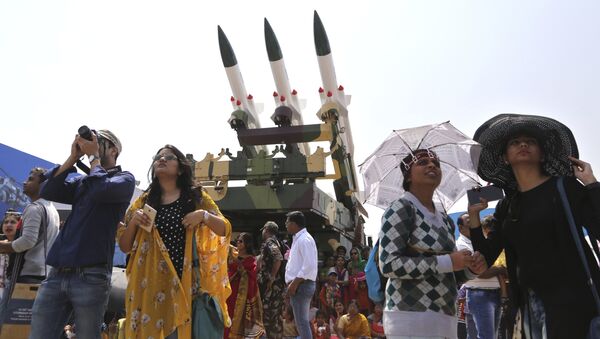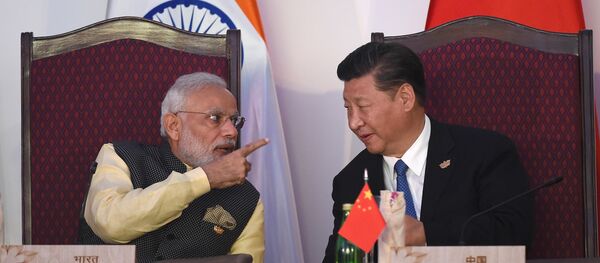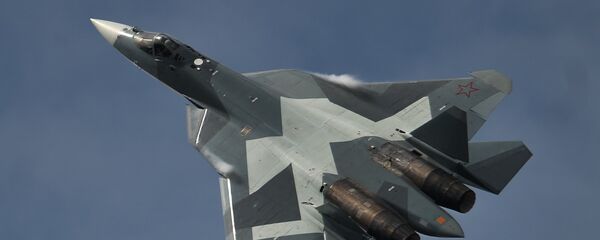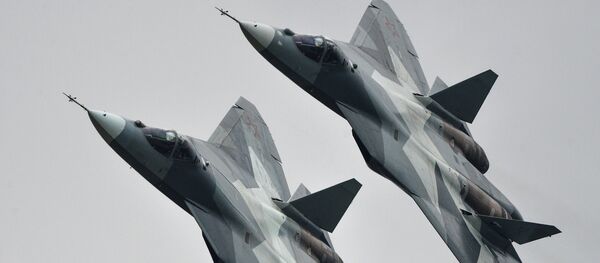India has become the focus of both the EU and the US' attention: While the International Monetary Fund's 2019 World Economic Outlook predicts that India is going to come out on top in terms of economic growth in 2019-2020, Trump's Asia Reassurance Initiative Act of 2018 (ARIA) provides New Delhi with access to US technology.
"It is natural that a country of India's size, resources and scientific talent will do well when allowed to grow without restrictions. India's rise is therefore a rightsizing of the global economy to how it always used to be — Asia centric", journalist and foreign affairs analyst Rakesh Krishnan Simha told Sputnik.
"However, some sectors such as aerospace and defence need to be opened up totally", he believes. "India also needs to export weapons to Asian countries such a Vietnam, which have been requesting advanced weaponry from India, which has been reluctant to oblige in deference to China. India must realise that it was always the top economy in Asia, well ahead of China, and it must be ready to occupy the top spot by edging out the Dragon".
India as Asia's New 'Technological Powerhouse'
Trump's 2018 ARIA envisages strengthening and broadening of diplomatic, economic, and security ties between the United States and India; furthermore, it "facilitates technology sharing between the United States and India, including license-free access to a wide range of dual-use technologies".
Does it mean India may soon become Asia's new "technological powerhouse"?
"For India, friendship with the US is necessary as it can avoid re-inventing the wheel", the journalist explained. "While the US is not expected to share its crown jewels, there is enough that can be acquired that will propel India's economy."
He underscored that "Israel is the perfect example how a small country has acquired advanced IT, telecom, medical and weapons technology through its close alliance with the US".
READ MORE: Xi-Trump Truce: China Dodged a Big Bullet, Saved Face in Trade War — Journo
However, according to Simha, "in order to become a technology powerhouse, one has to have a good base" and "mere friendship with the US won't be enough".
"India must have the capacity to absorb high-end technology", he highlighted.
To illustrate his point, the journalist recalled that India expected the US to provide it with EMALS catapult technology, which is critical for the Indian Navy's aircraft carriers.
"Now it transpires that after nine years of work, the system is plagued by delays and technical problems", Simha pointed out. "General Atomics, the US company that is developing it, has been criticized both by Donald Trump and the US Navy, which says the system suffers from 'poor and unknown unreliability'. So India can forget about getting EMALS for at least a decade".
Is the US Poaching Indian Talents?
"A disproportionate number (25 percent) of aerospace start-ups in the US are being founded by Indians, who are less than 1 percent of the US population", he stressed. "Are the US offers to help India a ruse to poach Indian talent?"
Fortunately for India, "in recent years, the number of Indians moving to the US had declined as the growing Indian economy is able to provide better opportunities for Indian scientists at home", Simha elaborated. "From the 1970s to the 2000s, the US was the prime destination for Indian software professionals and scientists. Now Bangalore, Pune and Chennai are offering similar high-tech environments for Indians".
"In this backdrop, the US offer may be a Trojan Horse", he remarked.
Friend or Foe: How India Turned Into US 'Ally'
While Washington is signalling willingness to share its duel-purpose technologies with India, it is at the same time cracking down against China's high tech sector, thus throwing a wrench into President Xi Jinping's "Made in China 2025" programme.
Moreover, the US has established a broad coalition of states and companies which say they would dump the 5G equipment by Huawei, the Chinese IT flagship.
It seems that Washington is seeking to tip the balance in New Delhi's favour.
"Nixon's advisor Henry Kissinger had once said about India and China: 'It serves our purposes best if we maintained closer relations with each side than they did with each other'. The US would never want India and China to become too friendly or even friendly at all", Simha recalled, commenting on the issue.
READ MORE: 'Historical Mistake': Academic Describes How US Facilitated Sino-Russian Entente
The journalist recalled that during the Cold War, the US was allied with China — "because it was the enemy's enemy" — and it was antagonistic towards India, which maintained close ties with the USSR. "However, now the boot is on the other foot — China is friends with Russia and India is no longer a natural enemy of the US", he opined.
Trump's ARIA designates India as a US "major defence partner", facilitating joint exercises, coordination on defence strategy and policy, military exchanges, and port calls in support of defence cooperation between the United States and India". In addition, it kicks off a "quadrilateral security dialogue" between the US, Australia, India, and Japan.
According to Simha, India will only win from this rebalancing, given its decades-long geopolitical competition with China, adding that "if the US is willing to offer trade, technology and investments in return, all that is a bonus".
"For India, a strong US presence in the Indo-Pacific and a rapidly rearming Japan are strategic windfalls, as it takes the pressure off its northern border, where the Indian Army and the Indian Air Force both maintain a massive presence", he believes, explaining that "the US' Pacific Pivot means China is now forced to move to look east, easing the pressure on India".
However, despite longstanding competition and burning border issues, India and China could still maintain a good relationship, Indian Minister of External Affairs V.K. Singh stressed on 6 February, as cited by The Hindu. "I don't think we are surrounded [by China]", he said. Commenting on Sino-Indian attempts to improve ties through trade, economy, bilateral investments and people-to-people contacts, he stressed that "it has been a good methodology to ensure that we soften some of things", adding that "it brings down those fixations and hard stances which exist".
The views and opinions expressed by the speaker and the contributor do not necessarily reflect those of Sputnik.





